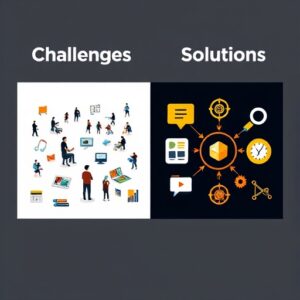Remote work has reshaped the modern workforce, becoming a staple for many organizations in the USA. For HR teams, this shift introduces new challenges and opportunities in managing distributed teams. This article explores the key strategies HR can adopt to effectively oversee remote teams, maintain productivity, and nurture a strong company culture.
The Challenges of Managing Remote Teams
1. Communication Barriers
Remote teams often face difficulties in maintaining clear and effective communication. Without in-person interactions, misunderstandings can escalate, leading to frustration and inefficiencies.
2. Employee Engagement
Remote workers can feel isolated, disengaged, or disconnected from their colleagues and the organization’s mission.
3. Productivity Tracking
Balancing trust with accountability is crucial, but tracking output without micromanaging can be difficult.
4. Maintaining Company Culture
A dispersed workforce makes it challenging to foster a sense of belonging and shared values.

The Role of HR in Managing Remote Teams
HR plays a critical role in ensuring remote teams remain productive, engaged, and aligned with company goals. Key responsibilities include:
- Developing Clear Remote Work Policies
HR must establish guidelines outlining expectations for work hours, communication protocols, and performance metrics. - Providing Technology Tools
Equip teams with collaboration tools like Slack, Zoom, and project management platforms to streamline work processes. - Focusing on Employee Well-Being
Offer mental health support, flexible schedules, and resources to reduce burnout. - Mediating Conflict
Resolve disputes quickly and fairly to maintain harmony within teams.
Key Strategies for Effective Remote Team Management
To successfully manage remote teams, HR should adopt these strategies:
1. Establish Clear Communication Protocols
- Use tools like Microsoft Teams, Slack, or Zoom for regular updates.
- Create structured meeting agendas to ensure efficient use of time.
- Encourage asynchronous communication for team members in different time zones.
2. Promote Flexible Work Hours
- Recognize that employees have varied schedules, especially across time zones.
- Implement a results-oriented approach, focusing on deliverables rather than hours worked.
3. Implement Robust Productivity Tracking
- Use Key Performance Indicators (KPIs) and Objectives and Key Results (OKRs) to measure performance.
- Conduct one-on-one check-ins to address individual challenges.
4. Encourage Virtual Team-Building Activities
- Host online trivia games, happy hours, or virtual coffee breaks.
- Celebrate milestones like birthdays or project completions through video calls.
5. Train Remote Managers
- Provide managers with resources on effective communication, conflict resolution, and inclusive practices for remote settings.
Know more about Building Inclusive Workplaces: DEI Strategies for US Businesses
Building and Sustaining a Remote Company Culture
1. Foster Inclusivity
- Celebrate cultural holidays and personal milestones with virtual events.
- Conduct DEI-focused workshops to ensure everyone feels valued.
2. Create Feedback Mechanisms
- Use tools like anonymous surveys or dedicated feedback platforms to gauge employee satisfaction.
- Regularly review feedback to implement meaningful changes.
3. Recognize Achievements
- Establish virtual awards or employee-of-the-month programs.
- Acknowledge contributions during team meetings or company-wide updates.

Technology and Tools for Remote Work Success
HR can enhance efficiency by providing access to the following tools:
1. Collaboration Tools
- Examples: Trello, Asana, Microsoft Teams.
2. Productivity Tracking Tools
- Examples: Time Doctor, Toggl Track.
3. Employee Well-Being Platforms
- Examples: Headspace, Calm, Modern Health.
4. Training Resources
- Examples: LinkedIn Learning, Coursera.

Real-World Examples of Successful Remote HR Practices
Case Studies
- GitLab: A fully remote company known for its detailed remote work handbook and transparent communication practices.
- Automattic: Implements asynchronous communication and robust DEI initiatives to maintain a cohesive company culture.
Best Practices
- Both companies prioritize open communication, regular feedback, and a focus on employee well-being to retain remote talent.
Bottom Line
A comprehensive onboarding process, encompassing these steps, is instrumental in cultivating a productive and satisfying work environment for new hires. From initial preparation to the six-month check-in, each phase plays a critical role in ensuring the new employee’s successful integration into the company. By meticulously adhering to this checklist, organizations not only enhance employee retention and productivity but also establish a robust foundation for long-term success and a positive workplace culture.
SW HR Consulting has been helping companies to build their teams and values for over 10 years. Contact us to find out more about our unique HR Outsourcing services and see how our expertise can benefit you.







